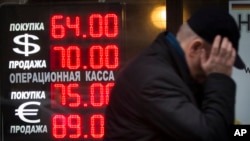Stock market turmoil, unconventional efforts to bolster the economy, faltering global trade, and years of economic expansion are sparking worries that the U.S. economy could fall into recession. However, key analysts say major economic indicators are pointing toward continued modest growth — at least for the time being.
The business cycle is one source of worry. Think of it kind of like tides in the sea, which rise for a while and then recede.
The business cycle is similar, though far less regular and predictable than the sea. Experience shows the current modest growth rate in the United States, will, eventually, turn downward for a while.
Behavioral economist Dan Geller of the “Money Anxiety” company says there have been six U.S. recessions in the past 50 years, and the average time between them is about seven years.
The economic crisis hit around seven years ago, and the economy has been recovering and growing since then. The recovery has cut unemployment in half and is prompting the Federal Reserve to consider ending a program intended to stimulate the economy with ultra-low interest rates.
Geller says the longest economic expansion in recent memory lasted around 10 years. With an eye on the end of 2017, he is watching economic data, and tracking worried consumers and investors with particular care, to see if some kind of economic decline occurs then. He also says anxious investors and consumers tend to save rather than spend their money. The level of consumer concern is important because consumer demand drives about 70 percent of U.S. economic activity.
Money anxiety, he adds, is “the main factor” that pushes the economy into recession. For now, he says, most economic indicators are consistent with continued growth, barring an unforeseen and unusually severe economic trauma like massive natural disaster or huge terrorist attack.
Other economists, including Allianz chief economic advisor Mohamed El-Erian, are concerned that the economic growth is too dependent on unprecedented kinds and levels of support from central banks. Support from the U.S. Federal Reserve, for example, includes record-low short-term interest rates, and programs to purchase huge quantities of government bonds to push down long-term rates.
In a television interview on CNBC, El-Erian said such stimulus efforts might become “totally ineffective.” He also says the U.S. economy is vulnerable to slowing growth in overseas markets, and puts the risk of recession in 2017 at 25 to 30 percent.
Other economists are more optimistic. S&P Capital IQ Strategist Sam Stovall says the odds of an economic contraction in the near future are around 10 to 15 percent. He says a recession would be signaled by a slowdown in the number of homes being built, but those numbers are rising right now.
PNC Bank economist Gus Faucher agrees, saying the odds of a U.S. recession soon are 10 percent or lower because domestic economic fundamentals “look good.” He says the U.S. economy is adding jobs at “a steady clip,” consumers are spending, and the housing market continues “its gradual recovery.”
The PNC Bank economist says a recession would likely be preceded by surge in layoffs, deterioration in the labor market, drastic declines in stock prices, and flagging international trade.
A slowdown in global trade raised worries recently as the Organization for Economic Cooperation and Development reported that international commerce has slowed to levels “consistent with global recession.” The OECD experts blamed slowing economic growth in China, weak commodity prices and other issues.
Faucher says the U.S. economy is growing more strongly than other nations.
Stovall says the risk that other nations could fall into recession is higher than the chance that the U.S. economy could begin to shrink. The United States is the world’s largest economy, but the second-biggest, China, is seeing growth slowdown, and Japan, the third largest economy, has just slipped back into recession.
Stovall says overseas problems could eventually affect U.S. growth, because national economies are as interconnected as climbers, roped together on a mountain side.
If one of them falls, he says, it “could drag us down as well.”













